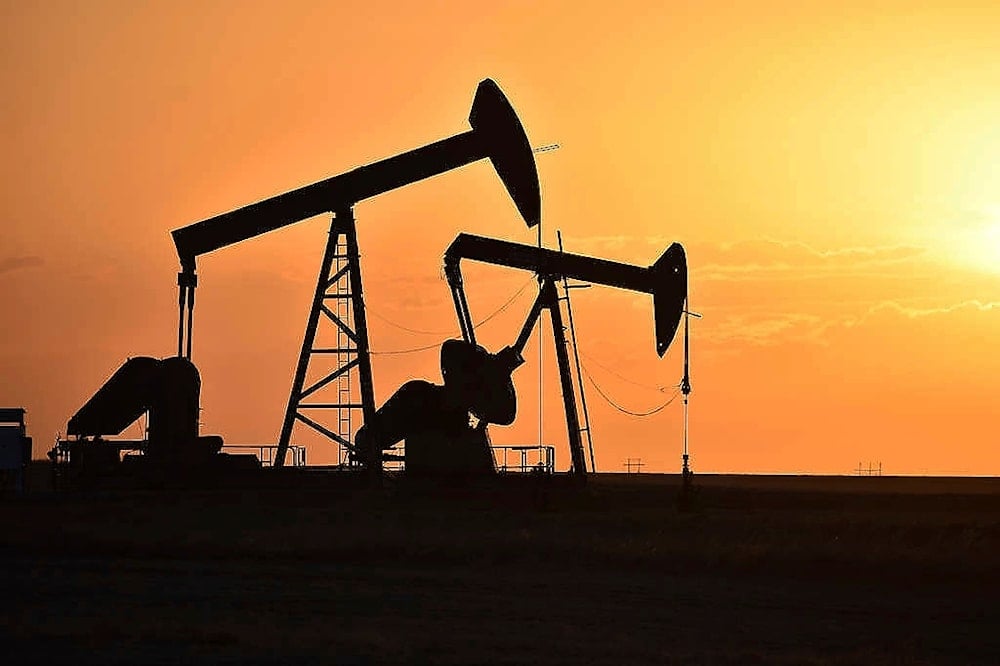OPEC+ to cut oil supplies by 1 million bpd; Brazil expected to join
The Russian Deputy Prime Minister has announced that Russia will increase oil sales cuts by 200,000 bpd in line with an OPEC+ policy.
-

Pump jacks extract oil from beneath the ground east of New Town, North Dakota, United States, on May 19, 2021 (AP)
The Organization of the Petroleum Exporting Countries' expanded group "OPEC+" has agreed to further cut oil supplies by 1 million barrels per day (bpd), Reuters revealed on Thursday, citing an unnamed source from OPEC+.
An OPEC conference was held at 10:00 AM (GMT) on Thursday, sources told Sputnik. Later the OPEC+ monitoring committee met at 13:30 (GMT), signaling a ministerial meeting of the alliance.
The news agency said that Brazil will join OPEC+ in 2024. "Brazil will join OPEC+ starting January 2024," the source said.
OPEC originally encompassed 13 oil-producing countries, including Algeria, Angola, the Republic of Congo, Equatorial Guinea, Gabon, Iraq, Iran, Kuwait Libya, Nigeria, Saudi Arabia, the United Arab Emirates, and Venezuela continues to be referred to as OPEC or OPEC-13.
Recently, several non-OPEC countries including, Azerbaijan, Bahrain, Brunei, Kazakhstan, Malaysia, Mexico, Oman, South Sudan, Sudan, and most significantly Russia, began to participate in the organization's policies, to form a loose grouping known as OPEC+. It is worth noting that these countries are still considered non-OPEC countries.
Read more: Russia, Venezuela to resume, double oil production
Russia announces oil sales cuts
On this note, Russia said it will deepen additional voluntary oil export cuts to 500,000 bpd and extend the policy timeframe until the end of the first quarter of 2024, Russian Deputy Prime Minister Alexander Novak announced on Thursday.
"Russia will deepen the additional voluntary reduction in oil supplies of 300,0000 barrels per day by another 200,000 barrels per day to reach 500,000 barrels per day, and will extend this voluntary supply cut until the end of the first quarter of 2024 in coordination with certain OPEC+ countries," Novak wrote in a statement published on the government's Telegram channel.
The Russian official said the cut will amount to 300,000 bpd of oil and 200,000 bpd of petroleum products.
In this context, Saudi Arabia said that will extend the additional voluntary oil production cut of one million bpd, introduced in July, until the end of the first quarter of 2024, the official Saudi Press Agency reported on Thursday. The country will continue to garner an output of 9 million bpd until the end of the first quarter of next year.
Earlier on, November 13, OPEC released a monthly report announcing that it expects an increase in global oil demand by 2.5 million bpd pushing overall demand to 102.1 million bpd.
This, alongside expanded oil cuts, is expected to raise oil prices, a result that Saudi Arabia has been actively seeking in 2023.
Russian-Saudi back on track?
Late in May this year, The Wall Street Journal reported that tensions are on the rise between Moscow and Riyadh. Russia had reportedly not abided with agreed cuts in oil sales, disgruntling officials in Saudi Arabia. The Kingdom's huge infrastructural programs, which come in line with Vision 2023, have led its government to cut oil production in a bid to raise global oil prices and meet projected expenditures for years to come.
The news of this dispute comes amid an improvement in relations between the two countries in recent years, especially on energy levels and a number of political files, most notably Riyadh's position on the war in Ukraine, which remained below the level that Washington had hoped from Riyadh. In light of recent events and a notable surge in the price of oil, reaching approximately $84 per barrel, since the report was published, it seems that Russian and Saudi policies on oil have experienced significant enhancement.
It is worth noting that last December, the European Union, G7 nations, and Australia set a price cap of $60 per barrel on Russian oil. Despite this constraint, projections indicate an anticipated increase in Russia's oil revenues owing to sustained escalations in crude prices and a reduction in discounts applied to its oil. Russia has adeptly sought alternative buyers, enabling the sale of its oil to third parties at a discounted rate—higher than the sanctioned $60 but still below prevailing daily market rates. This strategic maneuver showcases Russia's resilience in navigating the complexities of Western sanctions and global market dynamics.
Read more: Germany buys Russian oil from India: Reports

 4 Min Read
4 Min Read










